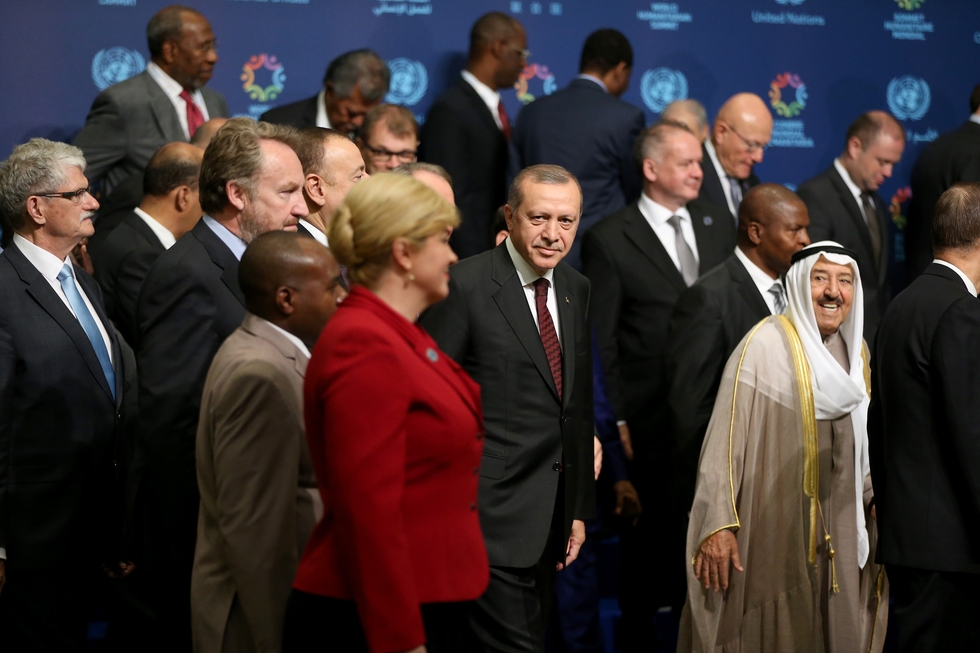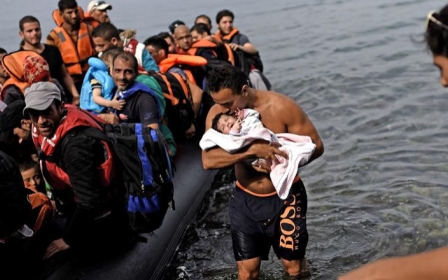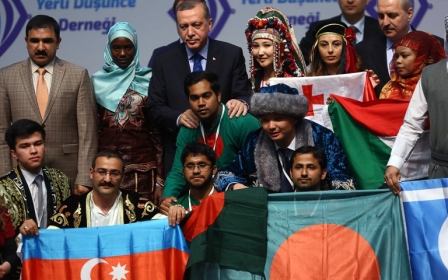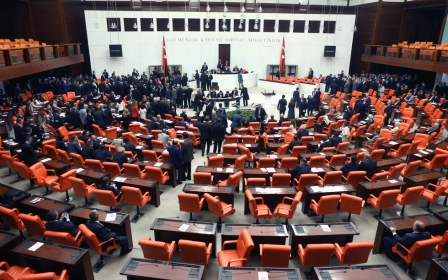UN humanitarian summit in Istanbul overshadowed by absences

ISTANBUL, Turkey – The first ever United Nations-backed World Humanitarian Summit got under way in Istanbul amid huge fanfare on Monday with 65 heads of state and prime ministers, more than 500 NGOs, and celebrity A-listers including James Bond star Daniel Craig in attendance.
But conspicuous by their absence were high-level representatives from the five permanent members of the UN’s Security Council: the US, Russia, China, the UK and France.
UN officials tried to downplay the situation citing a variety of international conferences also taking place globally and the tight schedules of the leaders of those countries.
Yet it appears telling that the leaders of the five biggest powers within the UN could not set aside time to address a situation that the UN calls the worst humanitarian crisis the world has faced since World War II, and one it believes affects 130 million people across the globe.
“I proposed this summit four years ago out of concern for the humanitarian situation. That concern has only grown since,” said UN Secretary-General Ban Ki-Moon during the opening ceremony. “We are here to shape the future and to declare we are one humanity.”
“We will never close our doors to human and humanity even if migration [from Syria and Iraq] continues and people continue to flee barrel bombs,” said Turkish President Recep Tayyip Erdogan during the opening ceremony.
“The current system is unfortunately insufficient. A system that can’t even get vaccines to those who need it is faulty. Turkey is trying to present a different model.”
Speaking before the conference, Jan Eliasson, the Deputy Secretary-General of the UN, said the event was a “wake-up call for action in the service of a common humanity”.
“We need to put victims first. This conference is all about the victims,” he said.
“The suffering of 130 million people in need of assistance due to both natural and man-made disasters means it cannot be business as usual. There are around 6,000 people here to find a solution and that is the first step in the right direction.”
Echoing those sentiments, Stephen O’Brien, the UN Undersecretary-General for Humanitarian Affairs and Emergency Relief Coordinator, said the summit was a once-in-a-generation opportunity to chart a way toward the prevention of peoples’ suffering.
He was careful to warn, however, that the success of the summit should not be judged on the amount of funds raised for humanitarian-focused activities. He said the focus was on developing a common strategy that makes raising funds later an easier task.
“This is not a pledging conference although any pledges made will be welcome. The measure of success of this conference will be how many people commit to action,” said O’Brien.
But he did point out that the UN’s annual estimate of required funds to provide urgent assistance to those 130 million people in need is in the $25-30bn range and that it had only managed to raise a quarter of that amount thus far.
Question marks have also been raised about the cost of holding such a large summit with 6,000 attendees. Eliasson was evasive in his response and without mentioning any sums said: “We are thankful to the host Turkey for the enormous generosity it have shown.”
Merkel to address EU-Turkey issues
Turkey has heavily promoted the World Humanitarian Summit and sought to bask in the spotlight as it hosts the inaugural event; while the war in Syria has also put the country on the frontline of the refugee crisis, with millions seeking sanctuary in Turkey or using the country as a route to mainland Europe.
However, as tensions have grown between European countries and Turkey regarding the implementation of a migration deal agreed in March, Ankara’s harsh rhetoric against the EU, and deteriorating press and political freedoms at home, the possibility of bilateral meetings on the sidelines being partially overshadowed by these matters is very real.
The summit is taking place with Erdogan's ruling Justice and Development Party (AKP) in transition following the appointment at the weekend of a new party chairman and prime minister, Binali Yildirim.
Yildirim is considered an Erdogan loyalist and said on Sunday that he supported a move towards a system of presidential rule, a long-term ambition of Erdogan who remains Turkey's dominant political leader.
Last week saw Turkish MPs also vote to overturn the legal immunity from prosecution from which MPs previously benefited, raising the prospect that scores of MPs from the pro-Kurdish HDP opposition party could be arrested.
Turkish security forces have also been conducting security operations against Kurdish militants in the country's southeast which have drawn international criticism.
"I clearly told President Erdogan that we feel a strong parliamentary system [for Turkey] is required," German Chancellor Angela Merkel was reported as saying following a bilateral meeting on the sidelines of the summit, after her spokesperson had previously announced that those issues would be brought to the table during her visit.
Merkel also said all conditions need to be met before Turkish citizens are granted visa-free travel rights to countries within the EU's Shengen free movement area.
But on Monday, Erdogan's economics adviser Yigit Bulut told the state-run TRT Haber television channel that Turkey could yet suspend the migration agreement if European countries continued to apply "double standards" in its dealings with Ankara.
"Turkey could review all relations with the EU including the customs union deal," Bulut said. "Readmission agreements, and all other deals could be suspended. Europe has to keep its promises."
Progress towards the full implementation of the deal, which would grant Turkish citizens visa-free travel to some EU countries, has stalled over EU demands that Turkey reform its terrorism laws.
Syrian shadow
Hanging over the summit most heavily is the continuing humanitarian tragedy in Syria and the failure of international efforts to end the country's more than five-year war.
Erdogan has been one of the staunchest critics of Syrian President Bashar al-Assad’s government, which is backed by Russia and Iran and has been accused of committing atrocities and even preventing aid from reaching people.
Syria and its allies meanwhile accuse Turkey, Saudi Arabia and others in the US-led coalition fighting the Islamic State (IS) group of prolonging the conflict by arming and backing a variety of rebel groups which Damascus accuses of being terrorist groups.
Critics argue that scant regard has been paid to humanitarian considerations by many parties directly or indirectly involved in conflict zones and that is one of the reasons why the international medical charity Medecins Sans Frontiers said it had decided to boycott the summit in Istanbul.
The MSF cited a lack of hope in the summit’s ability to convince states to address the weaknesses of the current humanitarian system.
Focus on education
Another vital issue facing the world today, in Eliasson’s view, is migration and those being deprived of an education as a result. He called the situation a ticking bomb.
“Education deprivation is a big, big issue. The migration crisis all over the world is costing an entire generation their lives, and Syria is a clear example of that,” he said.
Eliasson said there were 244 million migrants in the world and that there would be “repercussions” for the world if the situation remained unaddressed.
Apart from migrants being deprived of an education, schools in general have become targets, in the Middle East in particular.
A report by the United Nations Relief and Works Agency (UNRWA) stated that nearly half of the 692 schools it runs in the region had been impacted, attacked or otherwise rendered inoperable by conflict or violence in the last five years.
The UNRWA report also detailed what it called “deeply disturbing” attacks on schools in Syria, Gaza, Lebanon and the West Bank.
When it comes to humanitarian assistance, the world’s leaders have a long list of failures that campaigners and NGOs want them to pay more attention to.
CARE International warned leaders at the summit that neglecting gender differences made life-saving assistance less effective in humanitarian emergencies. CARE believes the world has a long way to go to ensure that the prevention of sexual violence and maternal deaths are considered as important as the delivery of food, water and shelter.
Lucy Beck from CARE said the current situation globally regarding the attention paid to gender-specific issues was a political failure, and although they were disappointed they still saw the summit as a good starting point.
“I think women suffer the most, but it is also almost always the women who are the real leaders of change. We need to empower them. They don’t need to just be victims,” she said.
While the list of issues due to be addressed at the summit is extensive, Eliasson said a good start could be made if widespread recognition of the need for the implementation of international humanitarian law could be achieved.
“International humanitarian law, whether it be the Geneva Convention or other relevant laws, is being ignored on an unprecedented scale all over the planet and that is one of the first issues that needs to be addressed,” he said.
The absence, however, of high-ranking officials from the five veto-wielding member states casts real doubt over whether any roadmap agreed upon at the summit can be implemented at all in real terms.
Middle East Eye propose une couverture et une analyse indépendantes et incomparables du Moyen-Orient, de l’Afrique du Nord et d’autres régions du monde. Pour en savoir plus sur la reprise de ce contenu et les frais qui s’appliquent, veuillez remplir ce formulaire [en anglais]. Pour en savoir plus sur MEE, cliquez ici [en anglais].





